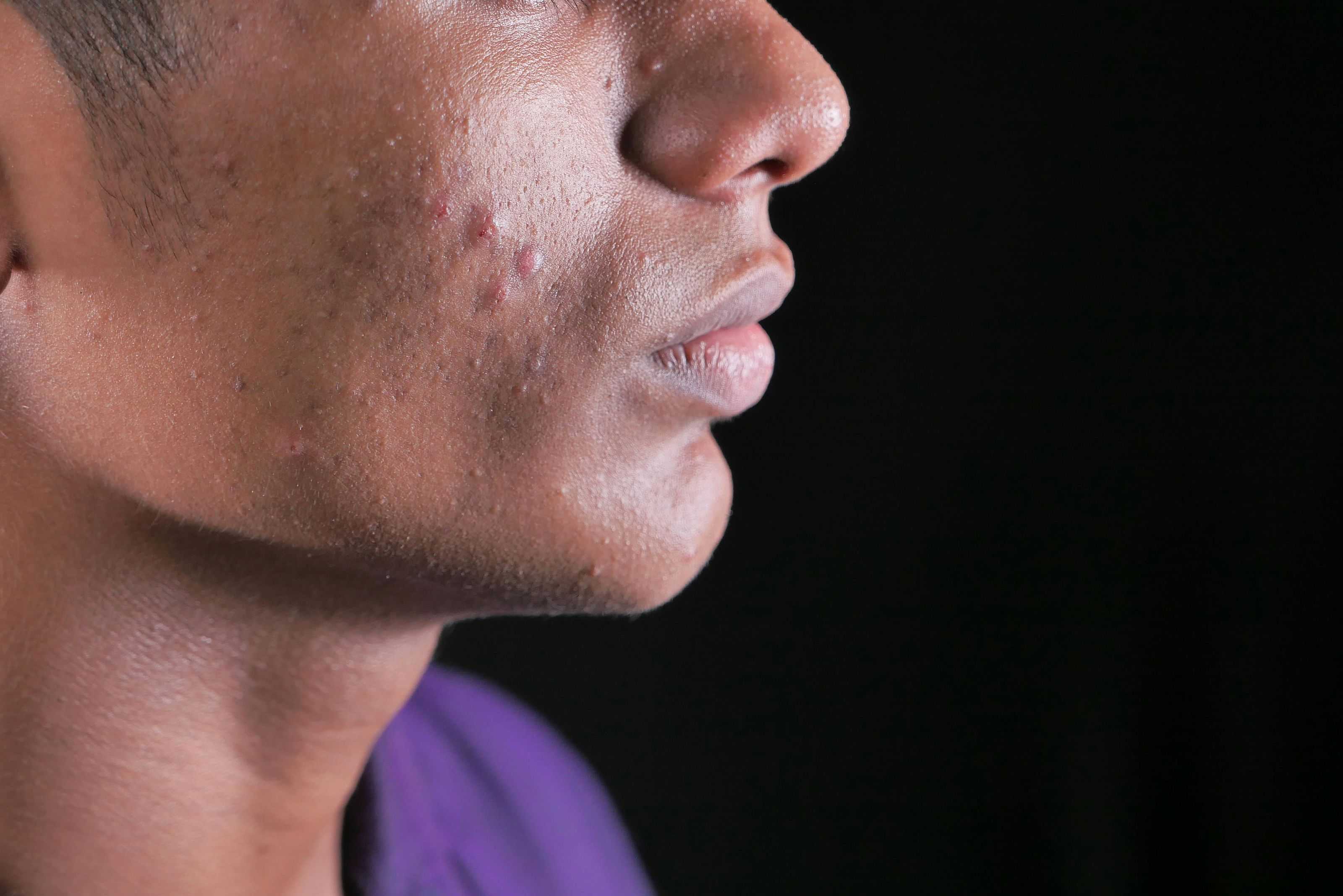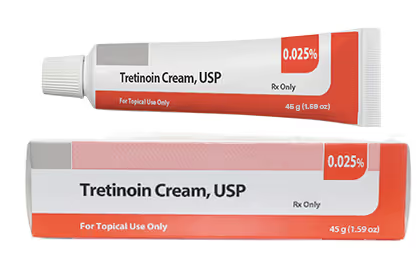Spironolactone for Acne: Your Guide to Hormonal Treatment
Navigating the world of acne treatments can feel overwhelming, especially when the breakouts you experience seem to have a mind of their own, flaring up in predictable yet uncontrollable patterns. For many, particularly adult women, this type of acne isn't just a surface-level issue; it's driven by internal hormonal fluctuations.
While cleansers and topical creams are essential parts of a skincare routine, they often can't address the root hormonal cause. This is where a medication like Spironolactone comes in.
Originally developed as a diuretic to treat high blood pressure and fluid retention, Spironolactone has become a cornerstone of dermatological practice for its remarkable effectiveness against hormonal acne. It offers a targeted approach, working from the inside out to regulate the specific hormonal triggers that lead to breakouts.
This guide will explore how Spironolactone works, who it can help, and what you can expect from treatment. We will break down the science behind hormonal acne and explain how this oral medication can provide significant, lasting relief where other treatments may have fallen short. For those struggling with persistent, hormonally-influenced skin concerns, understanding Spironolactone is a critical step toward finding a solution that finally works.
Understanding Hormonal Acne
Before diving into the treatment, it’s important to understand the condition it targets. Hormonal acne, as the name suggests, is acne tied to the fluctuations of your hormones. While it’s often associated with the teenage years, it can persist or even begin well into adulthood, affecting women in their 20s, 30s, 40s, and beyond.
Unlike the more scattered breakouts of adolescence, adult hormonal acne often presents in a distinct pattern, typically appearing on the lower third of the face—the chin, jawline, and neck. These breakouts are often deeper, more cystic, and more tender than typical whiteheads or blackheads, and they tend to flare in a cyclical pattern, frequently worsening in the days leading up to a menstrual period.
The primary culprits behind hormonal acne are androgens, a group of hormones that includes testosterone. While androgens are often labeled ""male hormones,"" they are present and necessary in all bodies, just at different levels. In individuals prone to hormonal acne, the sebaceous (oil) glands in the skin are particularly sensitive to these androgens.
When androgen levels rise or fluctuate, they send a powerful signal to the sebaceous glands to produce more sebum, the natural oil that lubricates the skin. An overproduction of this thick, waxy sebum can clog pores, creating the perfect environment for P. acnes bacteria to thrive. This leads to inflammation, and the painful, deep blemishes characteristic of hormonal acne. This internal trigger is why topical treatments alone are often insufficient; they can help manage the surface symptoms, but they don't stop the hormonal command to overproduce oil.
How Spironolactone Works for Acne
Spironolactone’s effectiveness for acne stems from its ability to intervene directly at this hormonal level. It belongs to a class of drugs known as androgen receptor blockers.
In simple terms, Spironolactone works by sitting on the androgen receptors of the oil glands and blocking them. It effectively prevents the androgens circulating in your body from delivering their message to ramp up oil production.
Think of it like putting a cover over a keyhole; the key (the androgen) is still there, but it can't get in to unlock the door (the oil gland's response).
By blocking this hormonal signal, Spironolactone reduces sebum production. With less excess oil, pores are less likely to become clogged, and the inflammatory cycle is broken at its source. This mechanism makes it fundamentally different from other common acne treatments.
For instance:
- Topical Retinoids like Tretinoin work by accelerating skin cell turnover, which helps to unclog pores and improve skin texture. They address the result of clogged pores.
- Oral Antibiotics like Doxycycline work by reducing the amount of acne-causing bacteria on the skin and decreasing inflammation. They address the bacterial and inflammatory components.
- Spironolactone works further upstream by addressing the hormonal trigger that initiates the entire process of pore-clogging and inflammation.
Because it targets the underlying hormonal driver, Spironolactone can be uniquely effective for individuals whose acne has been resistant to other forms of treatment. It provides a targeted, physiological solution to a hormonal problem.
Who is a Good Candidate for Spironolactone?
Spironolactone is a highly effective medication, but it's not the right choice for everyone.
A licensed medical provider will determine the best course of action, but generally, the ideal candidate for Spironolactone therapy is an adult woman who exhibits classic signs of hormonal acne.
These signs include:
- Acne concentrated on the chin, jawline, and neck.
- Breakouts that flare cyclically, often before or during menstruation.
- Deep, tender, or cystic inflammatory lesions.
- Oily skin that persists despite a consistent skincare routine.
- Acne that has not responded adequately to topical treatments or oral antibiotics.
This treatment is almost exclusively prescribed to women. Due to its anti-androgenic effects, it can cause undesirable side effects in men, such as breast development (gynecomastia). It is also not prescribed to individuals who are pregnant, trying to become pregnant, or breastfeeding, as it can interfere with fetal development.
In addition to treating hormonal acne, Spironolactone is also effectively used to treat female pattern hair loss, which is similarly driven by androgen activity at the hair follicle.
At Honeydew, our licensed providers conduct a thorough virtual consultation to review your medical history and skin concerns to determine if Spironolactone is a safe and appropriate option for you.
The Spironolactone Treatment Journey
Starting any new medication comes with questions about what to expect. The journey with Spironolactone requires patience, but for many, the results are well worth the wait. The process is managed carefully by a medical professional to ensure efficacy and safety.
Starting the Treatment
Treatment with Spironolactone typically begins with a low dose, often between 25 mg and 50 mg per day. This allows your body to adjust to the medication gradually.
Based on your response and tolerance, your provider may slowly increase the dose over several weeks or months to find the most effective level for you, which is commonly between 100 mg and 200 mg per day. This "start low, go slow" approach is key to minimizing potential side effects.
Before starting, and sometimes periodically during treatment, your provider may order a simple blood test to check your potassium levels, as Spironolactone can cause them to rise. This is a standard precaution to ensure the treatment remains safe for you.
What to Expect: The Timeline
One of the most important things to understand about Spironolactone is that it does not work overnight. It takes time for the medication to build up in your system and exert its effects on the oil glands.
A typical timeline looks something like this:
- First Month: You are unlikely to see a significant change in your skin during the first few weeks. Some people may even experience a temporary flare-up as their body adjusts. This is normal, and it is crucial to continue with the treatment as prescribed.
- Months 2-3: This is often when the first signs of improvement appear. You might notice your skin is less oily, and the frequency and severity of your breakouts may begin to decrease.
- Months 3-6: For most patients, this is the period where the most dramatic results occur. The skin becomes clearer and calmer, with a significant reduction in deep, inflammatory lesions. Full results are typically seen around the six-month mark.
Patience is paramount. The slow, steady progress reflects the medication's mechanism—it is fundamentally changing your skin's hormonal response, and that process takes time.
With Honeydew, our online platform makes it easy to track your progress with photos and share them with your care team. This ongoing monitoring allows us to see how your skin is responding and make any necessary adjustments to your treatment plan along the way.
Potential Side Effects
Like all medications, Spironolactone has potential side effects. However, they are generally dose-dependent and often manageable. The most common side effects are related to its diuretic and hormonal properties and may include:
- Increased urination (especially when first starting)
- Menstrual irregularities (spotting, lighter or missed periods)
- Breast tenderness or enlargement
- Dizziness or lightheadedness, particularly when standing up quickly
- Fatigue
A less common but more serious side effect is elevated potassium levels in the blood (hyperkalemia). This is why your provider may monitor your potassium levels. It’s also why you may be advised to avoid high-potassium salt substitutes while on the medication.
Most patients tolerate Spironolactone very well, and your provider will work with you to manage the dose in a way that maximizes results while minimizing these potential side effects.
Combining Spironolactone with Other Treatments
Spironolactone is a powerful tool, but it often works best as part of a comprehensive, multi-faceted treatment plan. Combining it with other therapies can address acne from all angles, leading to faster and more complete clearing. Your provider will build a plan tailored to your skin's specific needs.
Commonly combined treatments include:
- Topical Retinoids: Products like Tretinoin are a perfect partner for Spironolactone. While Spironolactone works internally to reduce oil production, Tretinoin works on the skin's surface to promote cell turnover, prevent pores from clogging, and improve skin texture and tone. It also helps fade the post-inflammatory hyperpigmentation (dark spots) left behind by old breakouts.
- Topical Antibiotics: For patients with significant inflammation, a topical antibiotic like Clindamycin may be prescribed to reduce bacteria and calm redness, especially during the initial months before Spironolactone takes full effect.
- Gentle Skincare: A supportive skincare routine is crucial. This includes a gentle, non-stripping cleanser, a suitable moisturizer to maintain the skin barrier, and daily broad-spectrum sunscreen. Spironolactone can sometimes make skin a bit drier, so proper hydration is key.
- Oral Contraceptives: Certain types of birth control pills can also help regulate hormones and are often prescribed alongside Spironolactone. This combination can be particularly effective and also provides necessary contraception, as pregnancy must be avoided while taking Spironolactone.
A Honeydew provider will work with you to build this comprehensive plan. If one combination isn't yielding the desired results, we can easily adjust the components, whether that means changing the strength of a topical or considering a different approach altogether.
Spironolactone FAQs
Here are answers to some of the most frequently asked questions about Spironolactone for acne.
Beyond Spironolactone: A Personalized Approach to Acne and Skin Health
Spironolactone is an excellent medication for hormonal acne, but it's just one of the many effective tools in modern dermatology. At Honeydew, we believe the best treatment is the one that is most personalized to you. If you are not satisfied with your current treatment, whether it's for acne, eczema, or psoriasis, we offer a wide range of options to maximize results while minimizing side effects.
If Spironolactone isn't the right fit, or for patients with different types of acne, other powerful options are available. For any type of persistent acne, providers may consider Isotretinoin, commonly known by brand names like Accutane. This medication provides a definitive, long-term solution for many patients. We also specialize in modern approaches like low-dose Accutane, which can deliver excellent results with a significantly lower risk of side effects, making it a viable option for a broader range of patients.
Furthermore, we recognize that a one-size-fits-all topical cream doesn't always work. That's why we offer custom compounding, where our providers can prescribe a unique formulation that combines multiple active ingredients—like Tretinoin, Clindamycin, and Niacinamide—into a single, easy-to-use product tailored to your skin's exact needs. This simplifies your routine and delivers a potent, personalized treatment.
Our expertise isn't limited to acne. For chronic inflammatory conditions like eczema and psoriasis, we provide access to the latest, most effective treatments available. This includes cutting-edge biologics like Dupixent for eczema and Skyrizi for psoriasis, which offer comprehensive relief for those with moderate to severe disease. Our providers can manage these advanced treatments entirely online, bringing specialized care directly to you.
Your Partner in Skin Health: The Honeydew Approach
We understand how frustrating it is when acne doesn’t respond to treatment, especially when you feel like you’ve tried everything. The journey to clear skin can be isolating, but you don't have to navigate it alone. At Honeydew, our mission is to make expert dermatological care accessible, affordable, and deeply personalized. We are here to listen, diagnose, and create a treatment plan that finally gets you the results you deserve.
Our entire process is designed around your convenience and your care. It begins with a one-on-one video consultation with a licensed dermatology provider—a board-certified dermatologist, nurse practitioner, or physician assistant—from the comfort of your home. Once your provider creates your personalized treatment plan, your prescriptions can be sent to your local pharmacy or delivered directly to your door with free shipping. But our support doesn't stop there. We believe ongoing care is the key to lasting success. Through our online platform, you can track your skin’s progress with photos, message your dedicated care team with any questions, and schedule follow-up consultations to adjust your plan as your skin evolves.
As a Honeydew member, you have unlimited access to your care team for ongoing support, prescription management, and lifestyle coaching, all for a transparent monthly or yearly price. We believe that if a treatment isn't working for you, you shouldn't have to wait weeks for an appointment to make a change. Our providers can manage, adjust, and recommend treatments completely online to make sure you get the results you're looking for. If you're ready to take control of your skin with a plan that truly works for you, schedule your consultation today.























